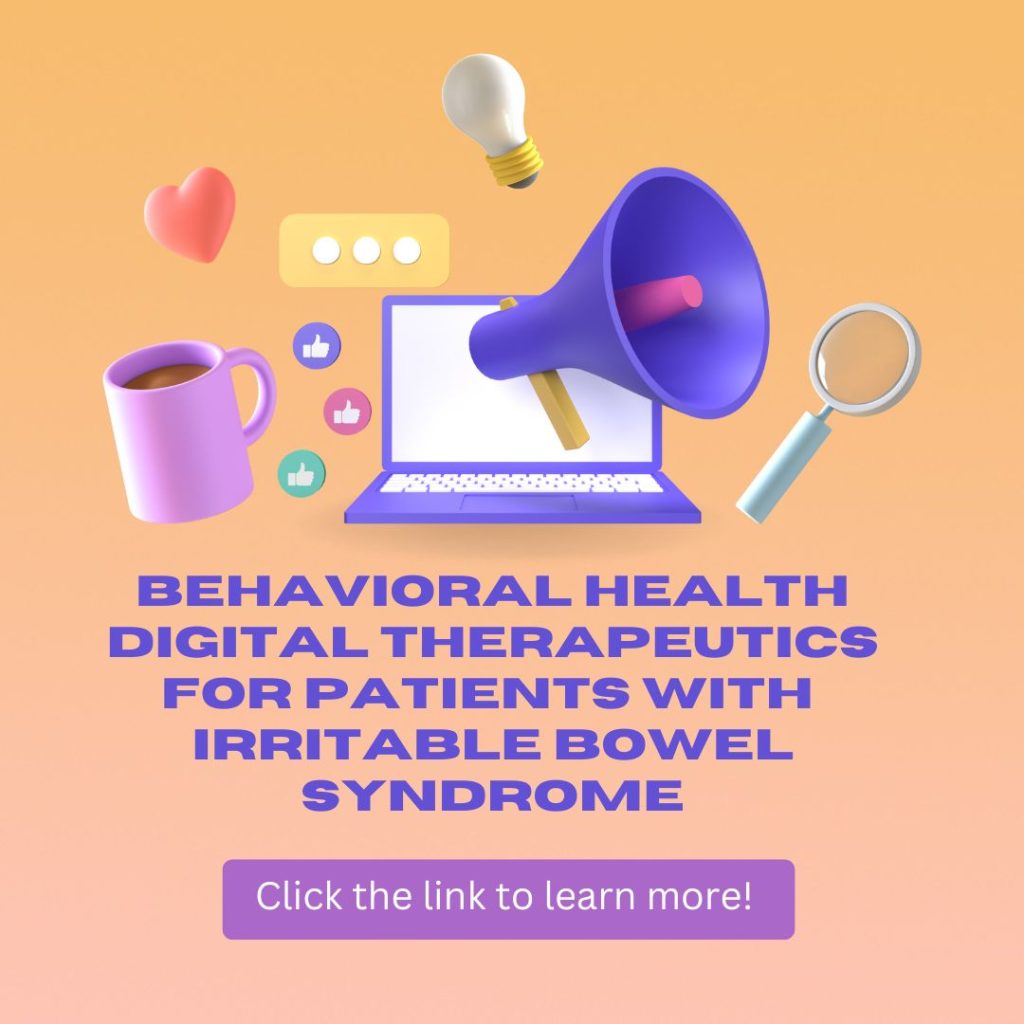24 Apr Digital IBS Tools
Behavioral Health Digital Therapeutics for Patients With Irritable Bowel Syndrome

IBS causes abdominal pain, bloating, and irregular bowel habits and negatively affects quality of life. The most effective treatments for IBS use a combination of medications, diet changes, and behavioral interventions.
Cognitive Behavioral Therapy (CBT) and Gut-Directed Hypnotherapy (GDH) have been effective at modifying behaviors and thought patterns in patients with IBS. However, many patients with IBS do not have access to gut-specific CBT or GDH services.
DTx could change that according to a new study published in the American Journal of Gastroenterology. Digital therapeutics (DTx) are not widely used yet, but they are expected to become more popular tools in the next decade to help patients who have IBS.
Read a summary of the study:
Mahana IBS, made by Mahana Therapeutics, is an FDA-approved, prescription-only CBT program for adults with IBS, with a maximum out-of-pocket cost of $90. The product includes 10 sessions over 12 weeks.
Available as a mobile app or web-based platform, Mahana IBS was validated in a randomized comparative effectiveness trial in a group of 558 patients who were divided into three groups that received web-based CBT, phone-based CBT, or treatment as usual. Before treatment, the mean IBS Symptoms Severity Score (IBS-SSS) for the entire group was 265.
At 12 weeks, the control group had an average reduction of 52.9 points, while the phone-based group had a reduction of 133.3 points, and the web-based group had a reduction of 101.2 points. Compared to the control group, the average Work and Social Adjustment Scale decreased by an additional 3.5 points in the phone-based group and 3 points in the web-based group.
Zemedy, made by Bold Health, is a mobile app that provides virtual CBT for patients with IBS through a chatbot, which costs $19.49 per month or $154.99 per year. The app isn’t FDA-approved and doesn’t require a prescription.
The program includes six weekly psychoeducational modules with information about IBS and CBT, followed by CBT training modules. Users can chat with an automated system that provides computer-generated responses for support, and a “flare module” supports patients when symptoms worsen.
Zemedy was evaluated in a crossover randomized, controlled trial with 62 people in an active treatment group and 59 people in a waitlist control group. The app improved several measures, including IBS-related quality of life, GI symptoms, visceral sensitivity, and depression. A larger clinical trial to validate the results is ongoing.
Regulora, made by metaMe Health, is an FDA-approved, prescription-only GDH program aimed at addressing belly pain related to IBS, with a maximum out-of-pocket cost of $75. The protocols were developed by GI behavioral health researchers at the University of North Carolina at Chapel Hill. Available on a web-based platform or mobile app, the program includes seven sessions of 30 minutes each over 12 weeks.
Regulora was evaluated in a randomized comparative effectiveness trial of 362 patients who used the program or another app that delivered muscle relaxation. Although there wasn’t a significant difference between the apps based on the primary focus of the study — a 30% or greater reduction in belly pain intensity — there was some relief. In the GDH group, 31% of people reported a 30% or greater reduction in belly pain intensity, and 45% experienced a 30% or greater improvement in the proportion of stools with normal consistency. The complete results of the trial still need to receive formal peer review and publication in a scientific journal.
Nerva, made by Mindset Health, is a GDH program delivered by mobile app or web browser and costs $79.99 for 3 months. It isn’t FDA-approved and doesn’t require a prescription. The protocols were developed in collaboration with researchers from Monash University in Australia. The program includes daily sessions over 6 weeks, which include psychoeducation readings and breathing techniques.
Nerva was evaluated in an observational study of 190 patients who completed all 42 sessions, typically within 2 months. About 64% responded to the program and reported a reduction in symptoms. People in the study also reported improvements in belly pain, bloating, dissatisfaction with stool consistency, flatulence, and nausea. The results were reported as an abstract, and full findings from a formal randomized, controlled trial aren’t yet available.